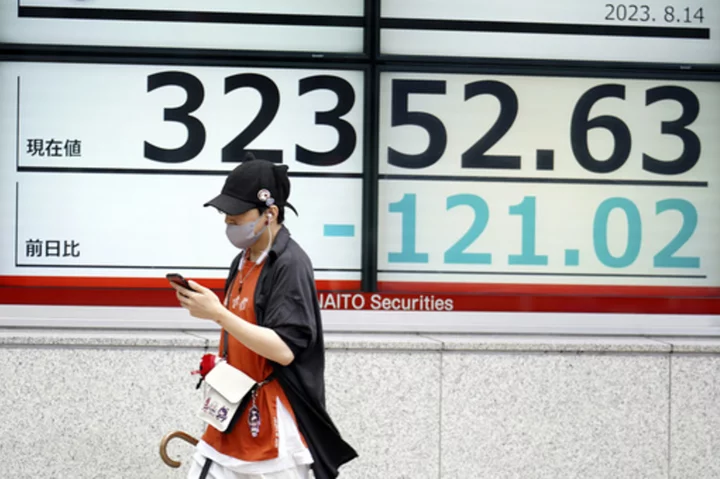BEIJING (AP) — Asian stock markets tumbled Monday after mixed U.S. economic data revived worries the Federal Reserve might hike interest rates again.
Hong Kong's main market index plunged 2.3% and Shanghai, Tokyo and Sydney also fell. Oil prices retreated.
Wall Street's benchmark S&P 500 index slipped 0.1% on Friday after government data showed producer price inflation accelerated in July. Earlier data showed consumer prices also rose faster in July.
“Setbacks to optimistic expectations are hard to ignore,” said Tan Boon Heng of Mizuho Bank in a report. “The data need to provide reasons” for the Federal Reserve "not to hike.
The Shanghai Composite Index fell 1.1% to 3,154.16 and the Nikkei 225 in Tokyo shed 1% to 32,160.30. The Hang Seng in Hong Kong sank to 18,629.82.
The Kospi in South Korea retreated 1% to 2,565.37 and Sydney's S&P-ASX 200 was 0.8% lower at 7,283.60.
New Zealand and Southeast Asian markets also declined.
On Wall Street, the S&P 500 fell to 4,464.05 on Friday after the Labor Department's producer price index rose 0.8% over a year earlier, accelerating from June's 0.2% rate. The index fell 0.3% for the week, its second consecutive weekly decline.
The Nasdaq composite fell 0.7% to 13,644.85. The Dow Jones Industrial Average gained 0.3% to 35,281.40.
The price data clashed with investor hopes the Fed will decide inflation is under control following a year of rapid rate hikes to cool economic activity and no more increases are needed.
The majority of Wall Street traders still bet the central bank will make no change to the fed funds rate at its September meeting, according to data from CME Group. Such hopes helped the S&P 500 rally 19.5% in the first seven months of this year.
Critics warn Wall Street too quickly formed a consensus that inflation is under control, the economy will avoid a recession and the Fed has ended its rate hike cycle.
Earlier, government data showed U.S. consumer inflation accelerated to 3.2% in July from the previous month's 3%. That is down from last year's peak above 9% but still higher than the Fed's 2% target.
Bond yields rose, including the two-year Treasury yield, which climbed to 4.89%. The yield, which closely tracks expectations for the Fed, had been at 4.80% right before the report’s release. The yield on the 10-year Treasury rose to 4.16% from 4.10% late Thursday. It helps set rates for mortgages and other important loans.
Fed officials say rate decisions will depend on hiring, inflation and other data.
Major U.S. retailers are set to report quarterly results this week, including Home Depot on Tuesday, Target on Wednesday and Walmart on Thursday.
In energy markets, benchmark U.S. crude lost 72 cents to $82.47 per barrel in electronic trading on the New York Mercantile Exchange. The contract rose 37 cents on Friday to $83.19. Brent crude, the price basis for international oil trading, fell 76 cents to $86.05 per barrel in London. It advanced 41 cents on Friday to $86.81 a barrel.
The dollar fell to 144.93 yen from Friday's 144.97 yen. The euro fell to $1.0933 from $1.0951.

